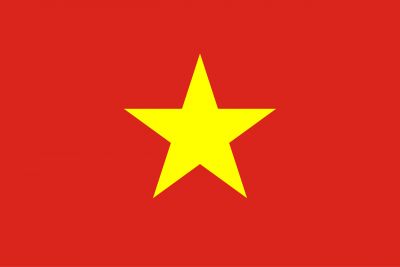Vietnam
Vietnam is a Southeast Asian country located on the eastern coast of the Indochina Peninsula. It shares borders with China to the north, Laos and Cambodia to the west, and the South China Sea to the east. The country has a population of over 97 million people, with Hanoi as its capital and Ho Chi Minh City (formerly Saigon) as its largest city.
Vietnam has a rich history shaped by Chinese, French, and American influences, notably marked by the Vietnam War (1955-1975), after which the country was reunified under communist rule. Today, Vietnam is a one-party socialist republic led by the Communist Party of Vietnam. The country has transitioned towards a market-oriented economy since the Đổi Mới reforms in 1986, leading to significant economic growth.
Culturally, Vietnam is known for its diverse traditions, cuisine, and landscapes, ranging from the Mekong Delta to the mountainous north. Key industries include agriculture (especially rice), manufacturing, and tourism.
-
World Map
-
Country Map
-
Flag
HISTORY
Before the Vietnam War, Vietnam's history was shaped by centuries of foreign influence and internal strife. Originally part of the Chinese empire for over a millennium (from around 111 BC to 939 AD), Vietnam gained independence and developed a distinct identity under the Đại Việt kingdom. During the 19th century, the country fell under French colonial rule as part of French Indochina, which included Laos and Cambodia. Vietnamese nationalism grew in the early 20th century, leading to the rise of revolutionary leaders like Hồ Chí Minh, who sought independence from French rule. Following World War II, Vietnam declared independence in 1945, but the French attempted to reassert control, resulting in the First Indochina War (1946–1954). This conflict ended with the 1954 Geneva Accords, which temporarily divided Vietnam at the 17th parallel into a communist-led North under Hồ Chí Minh and a pro-Western South under Emperor Bảo Đại. These divisions set the stage for further conflict, eventually leading to the Vietnam War.
[ SOURCE]
Vietnam Today
After the Vietnam War, which ended in 1975 with the fall of Saigon, Vietnam was reunified under communist rule, marking the beginning of a new era. The Socialist Republic of Vietnam was established, with Hanoi as its capital, and the country faced immense challenges in rebuilding its economy and infrastructure, devastated by decades of conflict. Initially, Vietnam pursued a centrally planned economy, which resulted in significant economic difficulties, including food shortages, poverty, and stagnation. In 1986, Vietnam launched a series of economic reforms known as "Đổi Mới," transitioning towards a market-oriented economy while maintaining its socialist governance. These reforms spurred rapid economic growth, opened Vietnam to international trade and investment, and gradually improved living standards. Despite lingering effects of the war, including unexploded ordnance and environmental damage, Vietnam has become one of Southeast Asia's fastest-growing economies, balancing its socialist political system with a more open market economy.
[ SOURCE]
PAVN Today
TEXT GOES HERE
[ SOURCE]


